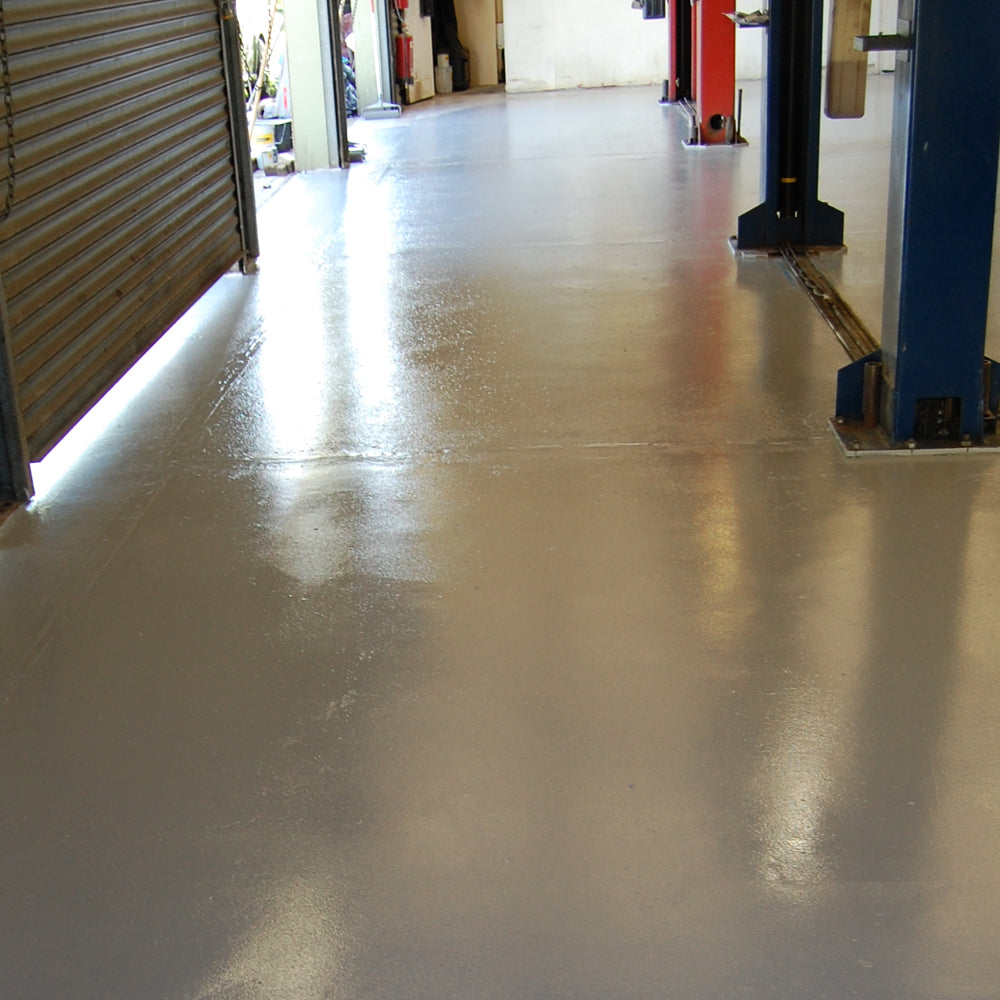Safeguard your space with a quality Epoxy-Coated Garage Floor solution
Safeguard your space with a quality Epoxy-Coated Garage Floor solution
Blog Article
The Comprehensive Guide to Comprehending Epoxy Flooring Options and Applications
When it involves flooring services, epoxy attracts attention as a resilient and versatile selection, ideal for an array of environments from commercial complicateds to properties. The globe of epoxy flooring is varied and detailed, with various types each serving distinctive objectives. Making an informed choice requires a much deeper understanding of the pros and cons, practical applications, and the actions to preserve such a floor covering solution. Browsing the nuances of epoxy flooring can be a journey of discovery, using insights into a world commonly overlooked.

Deciphering the Basics: What Is Epoxy Floor Covering?
Epoxy flooring, a term often heard but seldom explored, refers to a flooring surface area that is composed of numerous layers of epoxy used to a floor with a deepness of at least 2 millimeters. Epoxy, a two-part system being composed of materials and hardeners, develops a solid, resistant, and durable coating when mixed with each other. Apart from its stamina and resilience, epoxy flooring is likewise easy to preserve, requiring minimal maintenance - Epoxy Garage Floor.
Different Sorts Of Epoxy Flooring Solutions
While there is a general understanding of what epoxy floor covering is, many might not realize that there are several different sorts of epoxy floor covering solutions offered. The most common type is self-leveling epoxy, made use of to produce a smooth, degree surface over old, split concrete. It's commonly made use of in industrial and commercial areas. An additional type is quartz-filled epoxy, which mixes high-performance epoxy polymer resin with discolored quartz grains for attractive rooms needing hygienic and slip-resistant residential or commercial properties. There's mortar epoxy, the toughest type, generally made use of for heavy industrial settings. Finally, there's gravelled epoxy, using ornamental options for patios or large public areas. Each type offers specific demands, making sure epoxy floor covering accommodates numerous needs.
The Pros and Disadvantages of Epoxy Flooring
In spite of its various applications, epoxy flooring is not without its advantages and downsides. Its pros consist of toughness, resistance to use, and lasting luster, making it an ideal selection for high-traffic locations. Epoxy flooring is also resistant to a lot of kinds of damages, including those triggered by chemicals, water, and warm, which contributes to its charm.
Nevertheless, the application process is labor-intensive and requires a clean and dry surface area, which can be a deterrent for some. Additionally, epoxy floor covering can be unsafe when damp, presenting a safety and security risk.

Practical Applications of Epoxy Floor Covering in Various Industries
Serving as a stalwart in countless fields, epoxy floor covering finds its usefulness in a diverse variety of markets. In the production market, epoxy flooring's resilience and resistance to hefty equipment makes it a my explanation favored selection. Thus, the flexibility of epoxy flooring makes it a popular solution throughout numerous industries.

Steps to Install and Keep Your Epoxy Flooring
Provided its wide-ranging applications across various fields, it stands to factor that the correct installation and upkeep of epoxy flooring is of critical importance. Setup requires a clean, dry surface area, commencing with the removal of any kind of old paint or sealant, complied with by complete cleansing and drying out. Epoxy Garage Floor. site Next off, the epoxy combination is prepared, applied, and enabled to heal
Normal maintenance makes sure longevity and preserves the aesthetic appeal of the flooring. Therefore, correct setup and attentive maintenance are crucial for optimal performance of epoxy flooring.
Final thought
In summary, epoxy floor covering provides a flexible and lasting solution for a vast variety of spaces. Understanding the different epoxy flooring alternatives and their applications can direct you to the ideal service for your area, ensuring a floor covering investment that incorporates durability, performance, and aesthetic appeal.
Epoxy flooring, a term commonly heard yet hardly ever studied, refers to a floor covering surface that is composed of numerous layers of epoxy used to a flooring with a deepness of at the very least 2 millimeters.While there is a general understanding of what epoxy flooring is, several might not realize that there are a number of various types of epoxy floor covering More hints options readily available. One more kind is quartz-filled epoxy, which blends high-performance epoxy polymer material with discolored quartz grains for decorative spaces needing hygienic and slip-resistant residential or commercial properties.Provided its considerable applications across various fields, it stands to factor that the correct setup and maintenance of epoxy flooring is of critical significance. Understanding the different epoxy flooring alternatives and their applications can guide you to the optimal service for your room, guaranteeing a floor covering investment that integrates resilience, performance, and visual charm.
Report this page